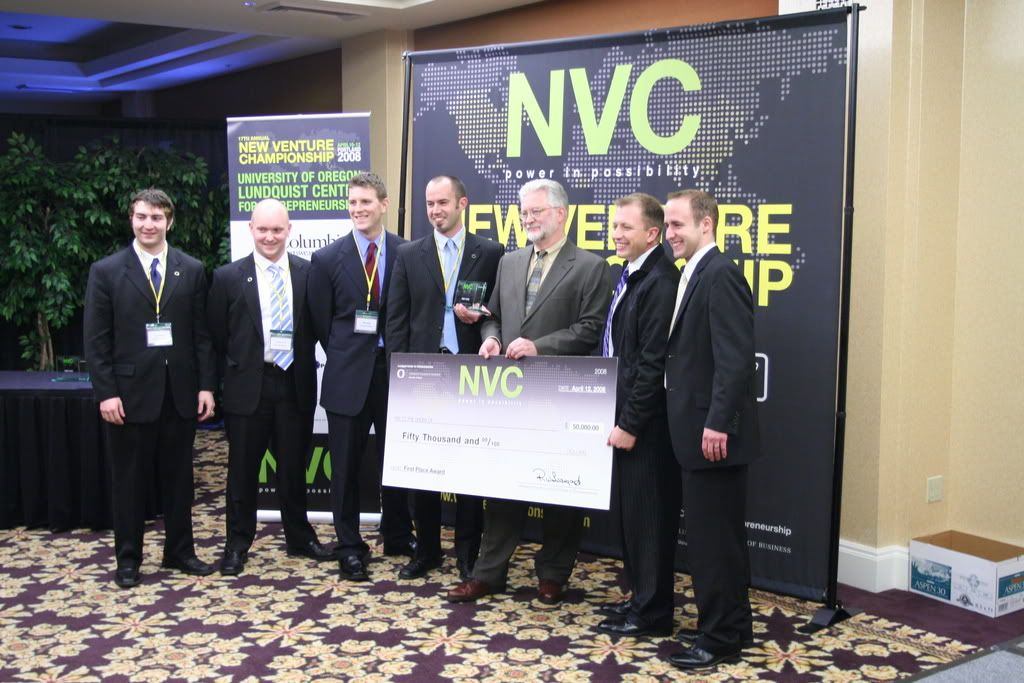I spent last Friday and Saturday in Portland as a semi-finals judge at the University of Oregon New Venture Championship (NVC). That means spending all day Friday listening to four teams, choosing one to go to the finals, and then giving feedback to all four. I also listened to two of the five finalists on Saturday morning. And I attended the finals reception Saturday night.
- Klymit, a venture built around new technology substituting adjustable gas insulation for what is now done with Thinsulate or goose down. This very intriguing new company has a strong management team, a strong technology-driven new business offering, and strong strategy. They did an excellent presentation. They also won the Palo Alto Software best written plan award, and another award for the trade show. They came in second the week before in the Rice University 2008 Business Plan Contest in Houston, just barely edged out by a very strong Qcue team from the University of Texas at Austin. Investors are jumping on board quickly. And the plan started with Business Plan Pro.
- A tie for first place. The finals judges took the $10,000 second prize and added it to the $50,000 first prize and gave $30,000 each to Klymit and TakeShape, from the University of Oregon. This is the first time I’ve ever seen that in a venture competition, so with Klymit doing as well as they have, I’m assuming TakeShape has to be very strong. I got the background information on this (confidential source): the five judges dug into their scoring schemes and did the numbers three different ways, and then again, and everything kept coming up so even that they gave up and called it a tie.
- An excellent luncheon talk by Dave Hersh of Jive Software. A brief entertaining story of a startup success, plus the entrepreneur as traditional iconic hero with the full cycle of challenge, achievement, sharing, and so on. My botched summary doesn’t do it justice. I hope to have more on this later. You so rarely get a morph of real startup wisdom and classic literature and mythology in the same luncheon talk. Wow!
- There’s a problem with comparing prizes and winnings from different venture competitions. The University of Oregon gives money to winners, as in checks, which they can deposit in their bank accounts. Many of the other similar intercollegiate competitions give a mix of money with services, or investment. I ask you: how do you compare $30,000 in real money to services worth $100,000? And what about investment of $125,000 that also brings you conditions and partners? These are interesting questions.

- I’m still uncomfortable with contest rules that force all ventures to compete as investment opportunities. This is the rule for venture competitions in the U.S. today; judges are asked to choose the best investment. This devalues entries like Recon Recycling, from San Diego State, an excellent bootstrapped company but doesn’t really need outside investment. Should a successful startup that shows a realistic plan to get past $10 million sales in a few years be ruled out because there’s nothing there for investors? That bothers me.
- I’m still seeing plans promising completely unrealistic profit margins. Don’t tell me you’re going to make $27 million net profit on $42 million sales, please, it lowers your credibility and doesn’t raise my interest.
- How about a team presenting with three young men, dressed in identical stylish dark suits with white shirts and identical stylish off-red ties. I didn’t give them style points but it does show good planning and that they are really trying to optimize all the details.
- My cool business award for the week goes to Comuto, which owns the leading carpooling site in France. More than 80,000 users, great strategy, great media successes, and an excellent presentation by founder Frederic Mazella. Seems like a really good investment opportunity for somebody, particularly somebody located in France.
- I wish the University of Oregon would hold this event in Eugene, a great small city, and the site of the university, rather than in Portland. Facilities on campus did just fine with this event in the past, and since the competition moved to Portland they’ve inaugurated a $45 million new business school building on the campus in Eugene. When I do this for other schools and other competitions I always like the fact that they are held on campus. It’s given me a chance to get to know Rice University and the University of Texas and I’m grateful.
- I like the idea of making the finals more inclusive by inviting the audience to judge. In Rice the finals were full to overflowing as something like 200 people were invited as judges. And David Miller mentioned in Campus Entrepreneurship last week how Boston University’s Institute for Technology Entrepreneurship and Commercialization (ITEC) competition allows real time voting for finalists by audience members. Great idea.




Comments
I would have loved to have seen the final presentations. The semi-finals were so interesting. You could tell which groups completely had a handle on their business and which ones didn't yet have all their ducks in a row.
Plus it was nice to finally see the whole thing instead of just read the plans.